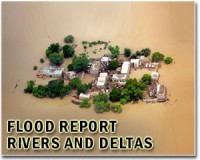| . |  |
. |
Sydney (AFP) Jan 27, 2011 Australia unveiled a flood tax on higher earners Thursday as Prime Minister Julia Gillard warned the deluge would shave 0.5 points off GDP in fiscal 2010 and cost Aus$5.6 billion for recovery. Gillard said the record inundation, which crippled the mining and farming state of Queensland this month, "may prove to be the most expensive natural disaster our nation has ever seen", with coal mines to suffer for months to come and farmers facing "seasons" of difficulty. "Treasury's preliminary estimates are that GDP growth in this financial year will be about half a percentage point less due to the floods," Gillard told the National Press Club, providing the government's first official estimates of the disaster's economic impact. "The best preliminary estimate of the direct cost to the federal budget of the summer's flood disaster is Aus$5.6 billion ($5.6 billion)," she added. The crisis continued in sodden southeastern Victoria state, with mucky torrents threatening to over-run villages as they pushed towards the Murray, Australia's largest river, frustrating residents. "This is day eight for us. It's getting a little bit hard to do night and day," said Natalie Goudie of the "black snake" of floodwater slowly encircling her tiny 200-person town of Benjeroop. "We're just trying to redirect it to find the lowest and natural path for it to get back to the Murray," she told ABC Radio. "We're trying to manage it. But at the moment it's managing us." Warning that the figures were early and could rise, Gillard announced a raft of spending cuts and said she would introduce a one-off levy on middle and high income earners to meet the cost. The 0.5 percent tax, expected to raise about Aus$1.8 billion, would only apply to incomes higher than Aus$50,000 for the 2011-12 financial year. It would increase to 1.0 percent for earnings above Aus$100,000, and people directly affected by the flooding would be exempt. The prime minister said it would cost someone earning Aus$60,000 just Aus$1 a week. Australia has used one-off levies in the past, such as to fund a gun buyback after a 1996 massacre in Tasmania, and to support the dairy and sugar industries. But Gillard, who holds a wafer-thin majority in parliament, may face an uphill battle to pass the measures after opposition leader Tony Abbott said his conservative bloc were against the move. They argue there is more room for spending cuts in the budget and Australians already face the prospect of a carbon tax. Some economists have questioned the wisdom of hitting taxpayers when Canberra plans to reduce corporate tax rates, and say relaxing the 2012-13 target for returning to budget surplus would be more sensible. Gillard must convince rural independents and a Green MP to back her when parliament reconvenes next month, which could prove difficult as most of the programmes slashed or put on hold Thursday were for carbon abatement or to boost particular regions. One of her key allies, Tony Windsor, prefers a permanent national disaster levy and warned her not to count on his vote, while fellow independent Rob Oakeshott said there were a "number of issues" with the government's package. The Greens, who are key government supporters, slammed the axing of carbon reduction programmes, saying it made no sense to cut such measures to fund relief efforts "when such disasters will be made worse by climate change". The prime minister said Canberra also would fast-track approval for temporary skilled migrants who wanted to go to work in flood areas in a bid to address labour shortages brought on by the country's Asia-driven mining boom. "Skilled labour will be as important as funding for rebuilding," she said. Unemployed Australians would also be paid to move to Queensland and work. Australia's jobless rate is at 5.0 percent, a level considered consistent with full employment. Gillard said the economy was strong enough to withstand the pressures of rebuilding without the government having to borrow extra money, stressing that doing so would ultimately increase inflation and interest rates. Commodities-driven Australia was the only advanced nation to dodge recession during the global financial crisis, with strong Asian demand for its coal, iron ore and other resources helping it stave off the worst of the downturn.
Share This Article With Planet Earth
Related Links Bringing Order To A World Of Disasters When the Earth Quakes A world of storm and tempest
 South Africa braces for months of deadly floods
South Africa braces for months of deadly floodsCape Town (AFP) Jan 26, 2011 South Africa was warned on Wednesday to brace for months of heavy rains and storms as the government admitted it could have been better prepared for floods that have killed more than 120 people. Weeks of above normal rains, caused by the "La Nina" weather phenomenon - also blamed for deadly floods in Brazil and Australia - have devastated thousands of homes and farms since mid-December. ... read more |
|
| The content herein, unless otherwise known to be public domain, are Copyright 1995-2010 - SpaceDaily. AFP and UPI Wire Stories are copyright Agence France-Presse and United Press International. ESA Portal Reports are copyright European Space Agency. All NASA sourced material is public domain. Additional copyrights may apply in whole or part to other bona fide parties. Advertising does not imply endorsement,agreement or approval of any opinions, statements or information provided by SpaceDaily on any Web page published or hosted by SpaceDaily. Privacy Statement |